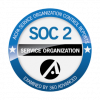FinCEN Setting More Priorities for AML Programs to be Present at Every Financial Institution
The List Continues to Grow
On January 28th, the United States Treasury Department released formal requirements for businesses to rigorously enhance their monitoring efforts against exposure to money launderers who increase their vulnerability to financial crime. The plan calls for all financial institutions to integrate an “effective and reasonably designed” Anti-Money Laundering (AML) program to assist in mitigating risk. This puts FinCEN in the spotlight once again in setting more priorities for AML programs, as the list of requirements continues to grow.
FinCEN Releases New Targets
FinCEN (Financial Crimes Enforcement Network), which operates under the Treasury, is proactively rolling out directives and setting specific targets for businesses, so they have a direction in which to steer their AML controls toward combatting. They have listed eight priority threats which require imminent action in combatting such as human trafficking, drug trafficking, proliferation financing, corruption, and both international and domestic terrorism.
A separate agenda also disclosed on Friday, showcases FinCEN’s plan to issue another notice of proposed rule-making, (NPRM), this month. It seeks to add additional reinforcements to the Corporate Transparency Act, a provision of the AML Act that mandates the creation of a national database of beneficial owners. This proposal will provide insight into the types of ownership data that the bureau intends to collect along with the entities that are now required to provide them to federal investigators and regulators.
The Growing Need for an Effective AML System
Most financial institutions, such as banks, will most likely already have an effective system that continuously identifies and measures their vulnerabilities to financial crime. However, non-banking financial institutions will be burdened by these new controls and will have to work diligently in implementing a solution that meets the requirements of being “reasonably designed” and “effective.” This formal mandate will also finally urge businesses within all industries to start conducting necessary risk assessments (if they haven’t already begun), as the ever-expanding regulatory environment releases new rules that will inevitably lead to screening all transactions, leaving none behind.
Luckily, Truth Technologies provides a comprehensive multi-service compliance ecosystem that goes far beyond meeting these two conditions and can help any business efficiently screen transactions, entities, and third-party relationships.Click here to learn more about what makes us the most trusted and premier compliance provider in the industry and schedule your free trial today!





